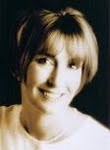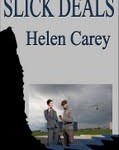Interview with Helen Carey
Initially published by Orion Books, a couple of years ago Helen took the plunge and turned independent and as I know many Firebirds and others are considering this (or have bravely taken it!) I thought I’d let her tell us her experiences.
 It’s always interesting to know where somebody comes from, so imagine yourself in the very beautiful and peaceful west of Wales, in an old stone farm overlooking the Irish Sea. When not writing her own novels, she paints (she runs her own studio with her husband) and also teaches writing at the University of Wales, with students coming from all over the world.
It’s always interesting to know where somebody comes from, so imagine yourself in the very beautiful and peaceful west of Wales, in an old stone farm overlooking the Irish Sea. When not writing her own novels, she paints (she runs her own studio with her husband) and also teaches writing at the University of Wales, with students coming from all over the world.
When Helen and I first met at a meeting of the UK’s Romantic Novelists Association, the book world was still in its predictable state; write book, find agent, get publisher. Helen was taken up by a great publisher, Orion, which has since been swallowed up by the mega Hachette Livre group. She brought out three books which sold well. Then the UK went through the years when publishing got stuck in recession. Gloom resonated at every writers’ gathering. And then, let there be light, the self-publishing revolution dawned, Indie presses, Amazon, B&N, you name it …
The world of books has flowered in ways we never dreamed of, the globe one big shop window. The UK is a strong market for women’s fiction and storytelling is back in fashion (Downton, anyone?) So while we may not be a market on a US scale, we’re still worth a punt over here! And, as Helen points out, it’s not so difficult to launch yourself this side of the pond. Just remember the difference between ladybugs and ladybirds, erasers and rubbers and that to get pissed over here involves alcohol and a good night out. So … Helen ….
Can you introduce yourself, maybe give a bit of background to what led you into being a writer?
My name is Helen Carey, I am probably best known for my LAVENDER ROAD series set in London in the Second World War. I have always wanted to be a writer ever since I was a child penning pony stories! I am also a big reader and I think that has helped me to understand how novels work and what makes them successful. This has also led me into teaching creative writing. I now teach at several universities, specialising in story structure, and very much enjoy helping students maximise their potential.
Give us a flavour of your writing, where your books are aimed at in the market.
My main aim is to entertain. I am a great believer in page-turning-power and my favourite compliment is when people complain that one of my books has kept them awake all night! I try to make my novels accessible and engaging by creating characters and situations that readers can relate to and believe in. My books are primarily aimed at women, and they seem to appeal to women of all types and ages, perhaps because of the range of characters, but I often get messages from men too saying they have enjoyed them too.
You and I were members of the UK’s Romantic Novelists Association, which occasionally went through agonies deciding how to describe itself. It always seemed to come back to describing itself as Romantic because Romance never goes out of fashion. Do you describe yourself as Romantic?
I certainly describe myself as romantic, but my books are perhaps more of a mix! Yes, there are lots of romantic elements and one or two big love stories, but I like to explore other emotions too. The basic theme of the LAVENDER ROAD books, for example, is about courage and how people, especially women, coped with the dangers and challenges of wartime life. THE ART OF LOVING on the other hand is romance through and through – it was even shortlisted for The Romantic Novelist New Writer’s Award some years ago. SLICK DEALS is more of a suspense novel, but forcing my oil trader heroine to get involved with the cool, American environmentalist, Nick Jardine, certainly adds an extra romantic frisson to the story!
Your writing career encapsulates the biggest changes in the publishing industry since Caxton had a good idea involving ink and metal plates. Do you wish that you were a writer living in the calm and predictable days of old-fashioned book publishing, or do you like the dynamic changes we’re going through?
I love the digital revolution! Mainly because it has given me an opportunity to republish my pre-existing books to a whole new audience. I also like having more control over my own work. But I also know that change is scary and nobody really knows how the publishing industry is going to develop in the future. The good old fashioned book publishing process was great for those of us who got picked up and published, but digital publishing has opened the door to lots of new writers and ideas. Anyone can be ‘published’ now and that’s great. The days of agents and publishers acting as literary gatekeepers have long gone. Yes, there is plenty of rubbishy stuff out there, but readers are surely capable of working out for themselves what they are likely to enjoy and that means that really good books will always rise to the top of the pile.
 You’ve decided in the last couple of years to digitally publish your own work. Any insights into how you approached that.
You’ve decided in the last couple of years to digitally publish your own work. Any insights into how you approached that.
When Kindle got going I realised that I had never sold the digital rights to my early novels so I looked into ways of getting them up on line. As they’d been published by Orion I didn’t have them on disc so I got them scanned in, and then edited and formatted them myself. It took quite a while to do but it was good to have the opportunity to do a few extra tweaks along the way. I bought ISBN numbers, designed covers, wrote blurbs and decided prices. I then borrowed instructions from a writer friend who had already gone through the process and uploaded the books to Amazon and Smashwords (for iBooks, KOBO etc). Luckily her instructions were brilliant and detailed and the whole process went incredibly smoothly.
Any advice?
Get good instructions from someone who has already done it! Then think carefully about how to categorise your book. And remember that people will be able to read the first few chapters before buying so make sure they are perfect. Promoting your book is another whole issue. I find Twitter, Facebook and a Blog a good combination. Creating a really readable book helps enormously of course, because once people start liking it and buying it Amazon will take over a lot of the promotion work for you.
Any advice for US writers wanting to get a foothold in the UK?
The answer is to write a great novel! In my experience readers don’t mind where the stories are set, they just want a really good story and great characters. My wartime novels, set mainly in London and Europe are extremely popular with readers in the US and Australia and New Zealand. As long as the books are listed on Amazon.co.uk as well as Amazon.com there shouldn’t be any problem interesting readers from different countries. Getting reviews on each site helps too. As far as promotion is concerned, social media is completely international, so making contacts all over the world is easy!
If you were starting the process again, would you do anything differently.
One thing I considered, but decided against, was the idea of giving books away free. Some people say it’s a good promotional tool but I feel it sends the wrong message and undervalues writers’ work.
Sorry to be cheeky, but is Indie financially viable?
Yes, definitely. But then I was lucky that I had four pre-existing books and another new one, SLICK DEALS, all ready to go. There’s no doubt that having a number of books available on line really helps. If people like one, they then buy the next and so on. For UK, US and European sales Amazon pay a royalty of 70% of the sale price, so for each £3/$4 book I get roughly £2.00/$3.00 which is more than double the 10% royalty I got from Orion for each paperback.
How do you deal with the Big A? Amazon, I mean. Do you sometimes wake up at night thinking … what if Amazon suddenly disappeared, or it was all a dream? Do you have a Plan B?
Who knows what will happen! We can’t see into the future but we can keep ourselves poised to take advantage of new opportunities as they occur! I don’t think Amazon will disappear, but it would be worrying if they gained a total monopoly. That’s why it’s important for authors and readers to support other digital publishers like iBooks, Kobo etc.
Can you tell us something about the book you’re working on? And your writing plans?
I am just about to start writing the fourth in the LAVENDER ROAD series. It is called LONDON CALLING and will be set in 1943. It picks up on many of the earlier characters, Jen Carter, Katy Parsons etc., but I will also be taking up the story of the young nurse Molly Coogan who has only had a small role in the previous novels. Exhausted by her relentless nursing routine and compelled to live with an awful secret, she longs to get away from wartime London, but when her wish is granted she finds that she has jumped out of a very calm frying pan into a tumultuous and life threatening fire! I’m hoping to have it finished by the end of this year.
Indie publishers need to buy in editorial guidance for their work … true or false?
There are two completely different processes of course, the story itself and the details of grammar, spelling etc. The latter just takes time and a careful eye, the former is much harder to get right. I was lucky in having Rosemary Cheetham (as she then was) as my editor at Orion. I learned a lot from working with her on my novels, and I spend a lot of time editing my students’ work, so I feel reasonably confident about dealing wtih my own work. That’s not to say I don’t run things past as many people as I can to get their comments. The hard thing is knowing what to take on board and what to ignore!
One of the most memorable characters in your Lavender Road series is Ward Frazer, who is Canadian. What was your secret ingredient for Ward and does he have a brother?
Yes, Ward Frazer, the Canadian air force pilot (and subsequently SOE agent) who first appears in Lavender Road is very popular. He is physically attractive of course, but I think his real appeal comes from his nonjudgmental acceptance of other people’s foibles, his mental strength and physical courage, and the romantic tragedy of his past. Also perhaps because he is the only person to see the true quality in the young, sickly Katy Parsons. He doesn’t have a brother, but he does have a cousin who will appear in LONDON CALLING!
You’ve just been on a research trip to Italy. This has to be the best side of being a writer, off to warm climates after a beastly winter. Is there a better job out there, and if so what?
Yes, research trips (or holidays, as my husband calls them!) are one of the perks of being a writer. Writing is a great job, independent, satisfying, creative, possibly lucrative. But it does have its hard side too, the eye strain, the brain strain, the worry about losing the pace, the danger of becoming antisocial and reclusive, the long hours at a hot keyboard, and the nights broken by flashes of clarity that have disappeared by morning!
Thanks for chatting with us and sharing your experience, Helen. You’re going to stick around and answer any questions and comments that come through. And if anyone wants to rootle through your biog and blogs, here they are …
http://www.helencareybooks.co.uk
http://helencareybooks.wordpress.com
http://www.twitter.com/helencareybooks
Youtube Book video



